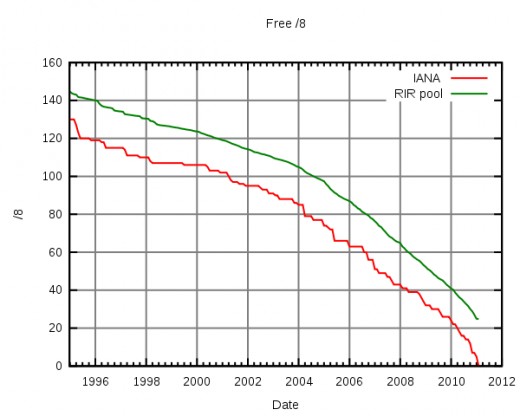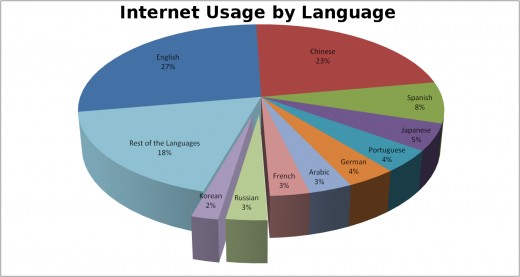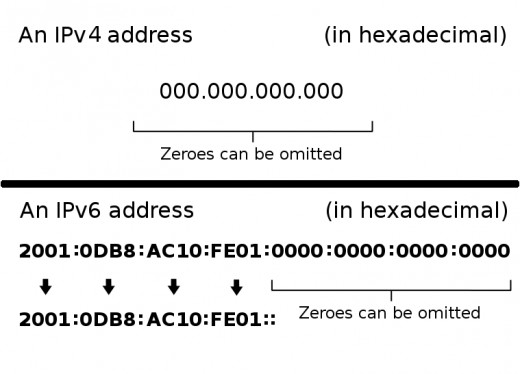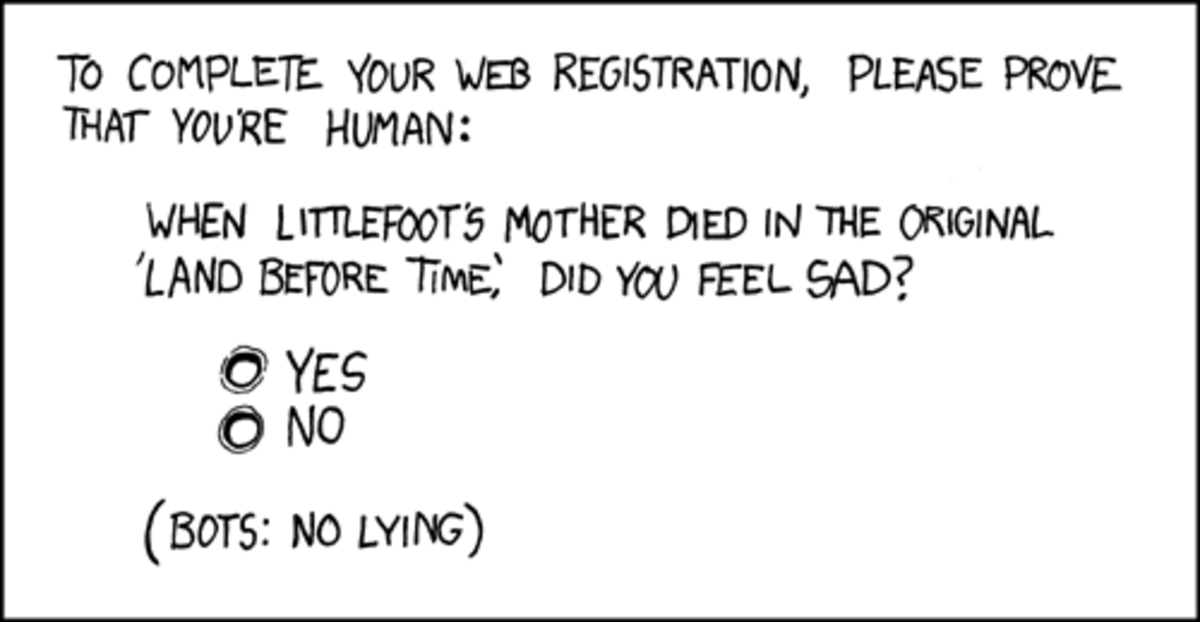Is the Internet is Running out of Room?
Is the Internet Running out of Room?
February 27, 2011
Yes and No!
As far as computers and networks that can host the various sites that make up the Internet, we will never run out of room. As more space is needed more space is simply added.
But the addressing that allows your web-browser to get to the right place is already close to capacity, so in a way, yes, the Internet could run out of "room."
In fact, the Internet Assigned Numbers Authority (IANA), has assigned the last blocks of valid Internet Protocol addresses to the various Regional Internet Registries (RIRs). This represents three hundred million (300m) internet addresses and they were all issued on February 5, 2011.

Internet Protocol version Four
The version currently in use, the one that has just been depleted to address providers, is called IPv4 or Internet Protocol version 4. This version supplied four point three (4.3b) billion addresses for the World Wide Web since 1991.
Now Internet Protocol version 6 is in it first release though most providers have avoided using it, relying instead on the addresses left with IPv4.
By the way, Internet Protocol version 5 never made the cut due to limited address availability.
Where Did they All Go
Where four point three billion (4.3b) addresses went:
- your Internet provider
- your, cable, phone, or DSL modem
- your cellular phone
- your smart phone
- the company you work for (likely multiple addresses)
- your Wi-Fi enabled device
- any GPS location device (such as Garmin or TomTom) which connects to the Internet for update information
In short, any device that connects to the Internet, no matter how seemingly insignificant, requires an IP address to operate. Because, without an IP address the device may be able to connect to the Internet, but it won't be able to send or receive information without a valid address. The address tells the Internet the exact location in virtual space, of every device connected to it.
Distribution by Language
Part of what depleted this resource that much sooner was the emergence of Asia as a major user of Internet Protocol addresses. In fact, China alone has more Internet users than the entire population of the United States. And if you look at the chart below you'll see, by percentage, that Chinese language speakers account for twenty-three (23%) percent of all IP addresses to all English speakers at twenty-seven (27%) percent; this as of the end of 2010.
English speakers, in this chart, include the U.S., Canada, England, Ireland, Scotland, Australia, New Zealand and any other former colony of the United Kingdom. In fact China is set to surpass even English speaking users by the year 2012 if not sooner.
Look to the table and chart below for some idea as to the distribution of IP addresses by language.

Language
| Count
| Percent of Total
| World Population
|
|---|---|---|---|
English
| 536,564,837
| 27.3%
| 1,277,528,133
|
Chinese
| 444,948,013
| 22.6%
| 1,365,524,982
|
Spanish
| 153,309,074
| 7.8%
| 420,469,703
|
Japanese
| 99,143,700
| 5.0%
| 126,804,433
|
Portuguese
| 82,548,200
| 4.2%
| 250,372,925
|
German
| 75,158,584
| 3.8%
| 95,637,049
|
Arabic
| 65,365,400
| 3.3%
| 347,002,991
|
French
| 59,779,525
| 3.0%
| 347,932,305
|
Russian
| 59,700,000
| 3.0%
| 139,390,205
|
Korean
| 39,440,000
| 2.0%
| 71,393,343
|
Rest of the Languages
| 350,557,483
| 17.8%
| 2,403,553,891
|
Sums
| 1,966,514,816
| 100%
| 6,845,609,960
|
Increased Demand Forcasted
Out of six point seven billion people on the planet there are almost two billion internet connected users/devices. With four point three billion addresses allocated that means many users have more than one, if not many more, individual Internet addresses for their devices.
That leaves another four billion plus who do not yet use the Internet. They most likely will in the near future.
Add to that load all the talk of Internet connected refrigerators, cars, and other
appliances. With the addition of a car that can communicate with other cars or a refrigerator that will send a message to your cellular device to tell you what to buy on the way home, it is quite clear that addresses are and will continue to be used up at a phenomenal rate.
Internet Protocol version Six
For the last fifteen years IPv6 has been set up and ready to go by operating system and router vendors. Unfortunately, the ISP (Internet Service Providers) waited to use up all the available addresses from IPv4 before moving forward on IPv6.
Every device that connects to the Internet has a unique identifier generated by the IP addressing system. Since 1982 most of these have come from IPv4, which generates 32-bit addresses as four sets of numbers (each with a value between 0 and 255) separated by dots. - Scientific American
Now it's time for ISP to begin using or preparing to use IPv6 and this may be problematic. There are more details to work out with IPv6 than there were with IPv4.
Standardized in 1996, IPv6 expands the Internet address nearly exponentially. Rather than the thirty two bit reference the addressing as been expanded to one hundred twenty-eight bits. That's four times the raw addressing, but represents one billion-trillion times more possible addresses that IPv4.
To put this to some scale IPv6 could currently allow all 6.7 billion people on the planet each to have 50,000,000,000,000,000,000,000,000,000 addresses of their very own.
In scientific terms that's one thousand octillion here in the U.S. or ten thousand quadrillion elsewhere.

Coda
With the new addressing protocol it seems inconceivable that we could ever run out of Internet addresses again. But, to be honest, the thought was that IPv4 would be good for at least another ten years. Unfortunately, the proliferation of Internet enabled devices ensured that this would not happen.
The good news is that engineers anticipated this well ahead of the actual problem. Unfortunately the Internet Service Providers were the ones "dragging their feet." But this will be made up shortly.
There May Still be Bumps in the Road
IPv6 is not compatible with IPv4. This means that devices that use the IPv4 protocol will not be able to communicate with devices that use IPv6. That, in turn, means that any services you currently use that connect via IPv4 will have to be updated, if, that is, they were not designed that way to begin with. In short, web-sites, set up to communicate only via IPv4 will not be able to send data to IPv6 devices.
For some idea of the addressing differences between IPv4 an IPv6, look at the graphic above.
Disclaimer
The author was not compensated in any way, monetarily, with discounts, or freebies by any of the companies mentioned.
Though the author does make a small profit for the word count of this article none of that comes directly from the manufacturers mentioned. The author also stands to make a small profit from advertising attached to this article.
The author has no control over either the advertising or the contents of those ads.






